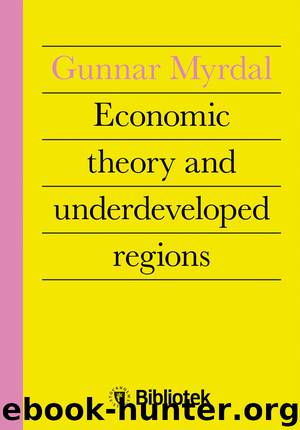Economic theory and underdeveloped regions by Gunnar Myrdal

Author:Gunnar Myrdal [Myrdal, Gunnar]
Language: eng
Format: epub
ISBN: 9789174374179
Publisher: Stockholms stadsbibliotek
Published: 2011-02-02T16:00:00+00:00
The Price System Does Not Give Rational Criteria for Economic
Planning
Naturally, the various elements of the price system—and, more specifically, money costs, prices and profit rates—constitute the terms in which in practice the national plan has largely to be enunciated. It provides a main means of detail comparisons within the plan, and most decisions from day to day on how to combine factors of production will have to be based on calculations of “opportunity costs” expressed in this manner.
In fact, a large part of the direction of the economic process towards the targets aimed at in the national plan has to be effected by changing costs, prices and profit rates through modifying the conditions under which the price system functions. To an extent this implies the transference of the social extra-profit yields into individual profits: in the ideal case the modification of the price system would have absorbed them altogether, so that individual profit rates gave motivations perfectly harmonious with the goals of the national plan.
The criteria for the national planning are, however, entirely outside the price system. There do not exist any “objective” criteria for economic planning. The plan and its targets have in the final analysis to be determined by decisions which represent choices made between different, alternatively possible, sets of goals and means. These choices are policy decisions, reached in terms of national development goals as determined by the political process.
From the beginning of the ‘twenties there was a lively discussion in our learned journals about the possibility of any rationality in a planned economy. It was started off by Professor Ludvig von Mises who declared that economic planning must fail, because the absence of a free market, and of a cost and profit system untampered with by the state would preclude the application of any economic criteria to determine in an objective way what should or should not be done.
This thought, that there are such things as “objective” criteria for determining how the social process should evolve, and that the market itself provides these objective criteria while planning is necessarily “arbitrary”, contains in a nutshell all the inherited, irrational predilections holding back economic theory to which I refer in Part II.
The ironical fact is that this very type of economic planning, the rationality of which has so recently been shown to be an impossibility on logical grounds, is now proceeding in almost all under-developed countries—often with the competent guidance of economists, many of whom, in another compartment of their thinking, harbour whole learned structures of fallacious arguments in the old tradition to which von Mises did no more than give a particularly unqualified and, therefore, crude expression.2
The price system as a part of a very irrational whole, namely the economy of a backward and stagnating country, can hardly have any great claim on rationality to begin with. It could even less form the rational basis for those “economic” and “objective” criteria as, furthermore, its continuous modification is a necessary part of the state interferences which form the operative part of the national plan.
Download
This site does not store any files on its server. We only index and link to content provided by other sites. Please contact the content providers to delete copyright contents if any and email us, we'll remove relevant links or contents immediately.
Aircraft Design of WWII: A Sketchbook by Lockheed Aircraft Corporation(32277)
The Great Music City by Andrea Baker(31915)
Call Me by Your Name by André Aciman(20488)
The Secret History by Donna Tartt(19036)
The Art of Boudoir Photography: How to Create Stunning Photographs of Women by Christa Meola(18612)
Shoot Sexy by Ryan Armbrust(17720)
Plagued by Fire by Paul Hendrickson(17402)
Portrait Mastery in Black & White: Learn the Signature Style of a Legendary Photographer by Tim Kelly(16996)
Adobe Camera Raw For Digital Photographers Only by Rob Sheppard(16968)
Photographically Speaking: A Deeper Look at Creating Stronger Images (Eva Spring's Library) by David duChemin(16678)
Ready Player One by Cline Ernest(14635)
Pimp by Iceberg Slim(14480)
Bombshells: Glamour Girls of a Lifetime by Sullivan Steve(14046)
The Goal (Off-Campus #4) by Elle Kennedy(13651)
Art Nude Photography Explained: How to Photograph and Understand Great Art Nude Images by Simon Walden(13029)
Kathy Andrews Collection by Kathy Andrews(11810)
The Priory of the Orange Tree by Samantha Shannon(9058)
The remains of the day by Kazuo Ishiguro(8968)
Thirteen Reasons Why by Jay Asher(8885)
